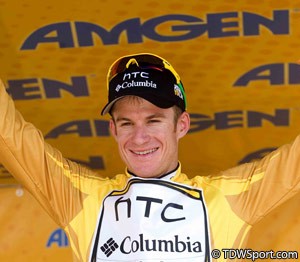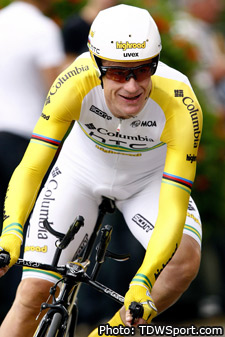Three-time World time trial champion has unfinished business in the race.
 HTC-Columbia’s Michael Rogers is looking forward to this year’s Tour de France more than he has for a few years. The Australian three-time World time trial champion has done a few things differently and feels that he has a chance to do well in this year’s race, as he told French Eurosport.
HTC-Columbia’s Michael Rogers is looking forward to this year’s Tour de France more than he has for a few years. The Australian three-time World time trial champion has done a few things differently and feels that he has a chance to do well in this year’s race, as he told French Eurosport.
Rogers is very clear about what the Tour de France means to him. “The same thing for all professional riders I think,” he said. “It’s quite simply the greatest race of the year. Moreover, besides the prestige, it’s the time of year when the riders renegotiate their contracts and where the teams look for sponsors. Thus, everyone seeks to exploit the Tour de France, there aren’t two races like the Tour.”
At the centre of Australia’s blackest day
His personal experiences at the race are very mixed; he has yet to actually win a stage, although he has come very close, and also came very close to the race lead as the race crossed the Alps three years ago. “I’ve had good and bad moments on the Tour,” he said. “In 2007 I came very close to the yellow jersey and I missed out. I crashed on the Cormet de Roseland and lost any chance. It was terrible, but that’s racing.”
That day, when he was maillot jaune virtuel [race leader on the road] he crashed on a descent, breaking his shoulder and forcing him to abandon. Dane Michael Rasmussen went on to win the stage and take yellow, before being fired by his Rabobank team over lying about his pre-Tour whereabouts.
The stage also saw the withdrawal of compatriots Stuart O’Grady and Robbie McEwen, the former with life-threatening crash injuries, on what was regarded as the blackest day for Australian cycling.
More than just Cavendish’s team this time
The HTC-Columbia team of 2009 (then called Columbia-HTC) often resembled an eight-man lead out train for super-sprinter Mark Cavendish. The young Manxman paid them back with an incredible six stage wins, but things will be different this year, says Rogers.
“This year we approach the Tour with different intentions,” said the Australian. “Last year HTC-Columbia thought only of winning stages, this year the team will be divided into two different parts: one to help Mark in the sprints, like Mark Renshaw, and another with riders to help me in the mountains. But everyone will have to do a little of everything, we’re a flexible, all-purpose team.”
Many teams have attempted to ride for both overall contenders and sprinters; they often find their resources diluted and manage to do well in neither area. Rogers acknowledges this, but still maintains that it’s the best option for the American squad.
“It’s not the simplest way to ride,” he admitted, “and you often see teams not succeeding. But we can’t have the same approach as last year, and we can’t sacrifice the chances of Mark in the sprints. So it will be necessary to be pragmatic and try to go as well in the two objectives.”
Not just a time triallist
 As a three-time World time trial champion, Rogers will not be phased by the longer than usual time trial on the Tour’s penultimate day. He does feel that it’s a little easy a course to really suit him, but also thinks that it will make little difference in the battle for the yellow jersey.
As a three-time World time trial champion, Rogers will not be phased by the longer than usual time trial on the Tour’s penultimate day. He does feel that it’s a little easy a course to really suit him, but also thinks that it will make little difference in the battle for the yellow jersey.
“I prefer courses that have a little more difficulty,” he said, “a little more undulating with lots of changes of rhythm. Personally I think the Tour will already be over on the day of the last time trial; the time trial will change nothing in my opinion, it’s such a mountainous Tour…”
With the Tour celebrating the centenary of the first crossing of the Pyrénées, many of the race’s toughest stages will be in the south-western mountain range, in the second half of the race. The mountains themselves will provide a formidable challenge, says Rogers, especially with so many kilometres already in the riders’ legs.
“The Pyrénées will be really hard,” he acknowledged, “they come in the last week when bodies are already tired – we will have already drawn on our reserves. The key to getting a good place on the general classification is to not have a jour sans [a bad day]. One bad day and you can lose 10 minutes; you just have to hang on. The important thing will be to avoid losing the Tour before it arrives in the Pyrénées. After that the strongest riders will fight for victory there.”
As for his own condition, he feels it is the best he has had in years and claims to be ready for a serious challenge to the overall classification. “I’m much more consistent than a few years ago, I think. I’ve also started working on time trials, which I’d given up for three or four years. I still had a little bit to progress to make and I also lost a little weight, which helps me to be more powerful in the mountains. I think about being competitive in all areas now.”
Stage race pedigree, but can he step up?
Victories in the Vuelta a Andalucia and the Tour of California this year, as well as second in the Criterium International and third in the Tour de Romandie, show that Rogers has what it takes to do well in stage races. Does he have what it takes to take the next step up to Grand Tours though?
“On paper,” he said, “if all goes well, then I have the means to have a very good Tour de France.”
“I think I’m in the best condition of my career. I changed a lot of things at the end of last season, in my way of training, for example. At the moment I’m perfectly reassured.”
Rogers’ three consecutive time trial rainbow jerseys, between 2003 and 2005, in many ways defined the Australian’s career for many years and to a certain extent held him back. This, he feels, added to a bout of mononucleosis, and a number of injuries, stopped him from realising his potential; he’s back on track now though.
“Getting those three titles was something fantastic for me, without any doubt,” he said. “That will always be an important part of my career, but perhaps after that I lost a little ambition. Then I lost a lot of time in the last few years, I was ill; I’ve had injuries, personal problems. I’ve put that all behind me and rediscovered my ambition; I’m looking to the future now and it’s exciting for me.”
At 30 years of age, Rogers had contemplated retirement as things had not gone his way. “I thought about it [retiring] mostly because I no longer got any pleasure from what I did,” he admitted. “I’d known some very painful moments, but to appreciate the best you also have to know the worst.”
He was quick to acknowledge those who had helped him in rediscovering his motivation. “My family, my close relations,” he said, “they pushed me; they made me remember that cycling had given me a lot of good times, that cycling was my life to a certain extent.”
To date Michael Rogers’ best Tour de France finish was 9th in 2006; if, as he claims, he is in the best condition of his life, he should be looking to beat that when the race starts in Rotterdam on Saturday.